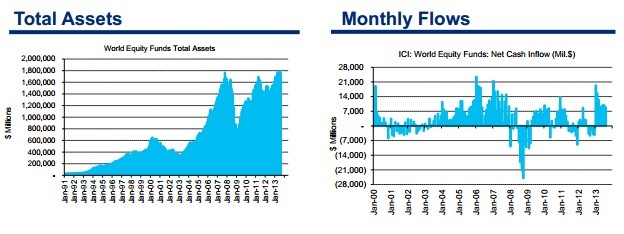International Equity Funds What Is an International Equity Fund
Post on: 27 Март, 2015 No Comment

International Equity Funds Are a Great Way to Get Foreign Exposure
You can opt-out at any time.
Please refer to our privacy policy for contact information.
Even if you don’t know much about mutual funds, you have probably had access to an international equity fund in a 401(k). So what is an equity mutual fund, and who needs one?
First, let’s tackle the equity part. An equity means stock. A share or shares of a company which you can buy or sell. Most mutual funds that aren’t all bond funds hold at least a portion of equities. They are more risky to own than bonds, but historically offer higher returns. (A lot of wealth—including Warren Buffett’s —is built through owning stocks.)
International equities are stocks of non-US companies. According to a report by Vanguard, non-US companies represent more than half of the global market capitalization. That means more than half of what all of the companies in the world are worth. About 73% of Fortune’s biggest global companies in 2011 were located outside of the US, according to a report by Edward Jones. If you don’t invest in international companies, you are missing out on investing in a lot of important companies.
Owning international equities can also help boost your returns. Between 1970 and 2011, the average annual rate of return from owning international stocks in developed markets was 9.6%. The S&P 500’s return was 9.8%. And because US markets and international markets don’t always move in the same way (international beat US stocks in the 1970s and 1980s, the U.S. dominated in the 1990s, international performed slightly better in the 2000s), owning international stocks can help reduce a portfolio’s overall risk. When one part of the world’s markets is underperforming, another may be performing well. Owning both helps to bring balance to a portfolio.
International equity funds are not to be confused with global equity funds. What’s the difference? Global equity funds are made up of stocks of companies anywhere. The US and the non-US If you invest in a global fund to get international exposure, you may find that the majority of the fund’s holdings is in US companies. And you may already own those companies in another equity fund. If you want diversification, international is the word to look for.
There are two types of international funds. Those that invest in developed countries and those that invest in emerging markets. Emerging markets are countries or regions that have less developed economies but a lot of potential for growth. But because most of these countries or their markets are less highly regulated, there can be risk involved in investing there. With greater risk, often comes greater potential return. And emerging markets returns in the 25 years between 1987 and 2012 were an average 12.5% per year.
Typically the international equity funds that are included in a 401(k) plan are large-cap equity funds that invest in developed countries. Like Japan, Germany, United Kingdom. If a plan does offer emerging markets equities, it will probably be in a separate fund. Financial advisors often recommend that investors who choose to own emerging markets equities should limit exposure to no more than 5% of an overall portfolio.
Risks of Investing in International Equities
There are several types of risks associated with investing internationally.
Currency risk . The value of the dollar will differ from the value of the fund’s underlying currencies. This can help to boost your returns when the dollar is weaker, regardless of how the investments are performing. But when the dollar is strong, it can have the opposite effect.
Political risk . The stability and oversight of local governments matters to the markets. Anytime you are investing in a foreign country (or even your own) there is a risk that the economy or government may face unforeseen troubles.
Liquidity risk . The US stock market is fairly liquid. Meaning, a large volume of stocks are bought and sold on it every day. What that means to the average investor is when you want to sell a stock, there’s usually a willing buyer. What if there was no buyer and you had no choice to hold onto it until one came along? That’s an illiquid market. Foreign markets have a lower trading volume than US markets.
There are other things to consider with international funds. Are the accounting and reporting standards of the same standards that we have in the US? Are the fees for investing in these stocks greater than those charged to invest in US stocks? A fund that is managed well will anticipate and understand these risks to some extent. International investing is much more easily done within a mutual fund.
The Bottom Line for Investors
- If you want a truly diversified portfolio, having an investment in international equities is essential.
- While there are some risks, and some investors fear the unknown, international equities make up a large part of the world market’s potential investment growth.
- Experts tend to recommend that no more than 20% to 35% of a portfolio be allocated to international equities, or even less depending on your risk tolerance and focus on growth.
- Conservative investors will favor developed markets over emerging markets.
- Look for the word international as opposed to global when choosing a foreign investment fund.
Disclaimer: The content on this site is provided for information and discussion purposes only, and should not be misconstrued as investment advice. Under no circumstances does this information represent a recommendation to buy or sell securities.














